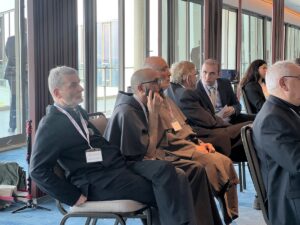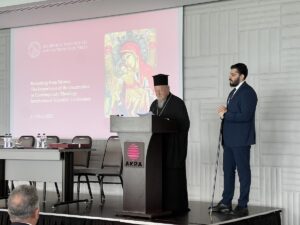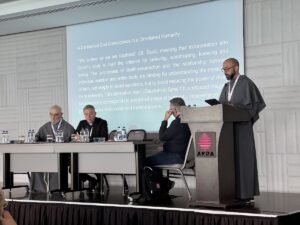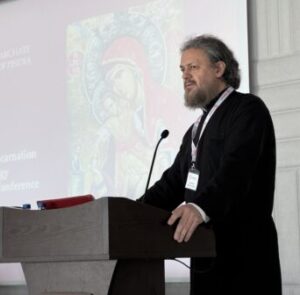International Conference on the Incarnation and Nicaea Held in Antalya
The conference marked the 1700th anniversary of the First Ecumenical Council of Nicaea (325), whose Creed remains a defining proclamation of faith in the divino-humanity of Christ. Inspired by the legacy of the Holy Fathers, the gathering sought to reawaken the Church’s theological mission in the context of today’s cultural and spiritual challenges.
The conference brought together 25 speakers from 11 different countries, scholars and pastors, eminent professors and young researchers, coming from different Christian Churches, whose communications were of a high scientific level. They were welcomed by Mr. Vural Korkmaz, representative of the Mayor of Antalya-Muratpasa Municipality, who attended the first session of the conference. Also present at the conference were His Excellency Marek Solczynski, Apostolic nuncio to Turkey, and His Excellency Martin Kmetec, Roman Catholic Archbishop of Izmir, as well as local Christian clergy and faithful.
His All-Holiness Patriarch Bartholomew delivered the inaugural address, opening a two-day program filled with panels that drew together hierarchs, clergy, and distinguished theologians from across the Orthodox world and beyond. Among the panelists were representatives of various Christian traditions, including Cardinal Claudio Gugerotti, Archbishop Angaelos, and leading scholars such as Metropolitan Maximos of Selyvria, Paul Gavrilyuk, Pantelis Kalaitzidis, Alexis Torrance, and Christophe Chalamet.
The eight thematic panels addressed pressing topics such as:
· The Incarnation in pastoral proclamation and mystagogy,
· The Word of God in liturgical and ethical life,
· Christian unity and public witness,
· Eucharistic theology and ecological responsibility,
· The body as theological vocation,
· And the relationship between eschatology and history.
Metropolitan John Zizioulas’ theological vision was notably evoked in the final panel, “The Ultimate Things: Building History from Eternity,” where Bishop Maxim (Vasiljević), Professor Chalamet, and Fr. Elia Citterio reflected on the enduring relevance of Nicaean eschatology in the present moment. In his presentation, Bishop Maxim reflected on the enduring theological significance of the First Ecumenical Council. He explored how the Council of Nicaea not only addressed doctrinal clarity but also wove together eternity and history, shaping the Creed as a Eucharistic and eschatological confession, rather than a mere set of propositions. Drawing on the theology of Nicene fathers, he emphasized that terms like παντοκράτωρ (Almighty) should be understood not as expressions of divine domination but as the relational power of communion
and love. The Nicene canons, he noted, bear witness to the Church’s pastoral wisdom, offering a balance between tradition and renewal, while always aiming toward koinonia, the healing of division and the restoration of Eucharistic unity. He also highlighted how the celebration of Pascha and even the Church’s liturgical posture were understood through the lens of eschatological hope—the future shaping the present. In closing, he reminded listeners that the legacy of Nicaea is not a static relic but a living challenge, calling each generation to approach the truth not as imposed law, but as a reality to be celebrated, received, and lived in communion.
The atmosphere of the conference was marked by theological depth, spiritual warmth, and sincere ecumenical dialogue. The conference program also included a concert by the choir of the Church of St. Alypios in Antalya, conducted by Lidia Maslova, who performed liturgical hymns and traditional songs from different countries of the Christian world. The communications and discussions can be listened to on the YouTube channel of the Metropolis.
The conference sessions were broadcast on the YouTube channel of the Holy Metropolis of Pisidia, offering a wider audience the opportunity to follow this important theological event.











